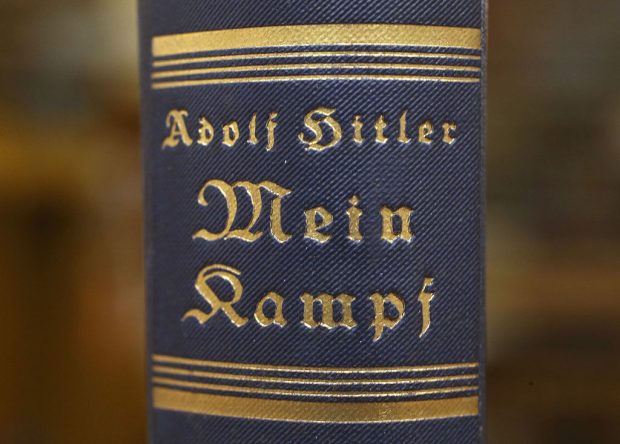A dead white man called Adolf Hitler has sold nearly 100,000 copies of his memoir, Mein Kampf, since a new edition was published last year in Germany. The book wasn’t officially banned in the country, but the copyright was owned by the state of Bavaria which prevented new editions being made.
I have to admit to never having read Mein Kampf, largely because I’m quite small-minded and if everyone says a book is terrible I can’t be bothered to try it. Hitler wasn’t much of a thinker; even his many detractors would admit he was more of a doer. So what explains the renewed success of his book in Germany? Is this publishing sensation linked to the rise of a new Fascism in Europe?
No. The truth behind the story is somewhat more complex, for according to the BBC the new annotated edition of Mein Kampf, which costs £49, has seen sales boosted by being bought up by university departments and other institutions. This is pretty much the only way an author of political non-fiction is guaranteed to make lots of money; so if you want to make a living writing books, invade Poland first.
Far from being fertile ground for Hitlerism, politically Germany seems to be diverging from the rest of Europe, as its neighbours both to the east and west turn against open-borders liberalism (Sweden being the other exception). Angela Merkel’s popularity has gone up since the summer, despite her immigration policy; and Germans overwhelmingly do not blame the chancellor for the recent attack in Berlin.
Some British Jews are now applying for German passports, to the very country their ancestors fled, because it remains the liberal bastion of the west. Of course the tragic irony is that Merkel has imported hundreds of thousands of people from the most anti-Semitic countries on earth, Mein Kampf already being popular in Syria and also popular with the Ba’athists who were openly inspired by Nazism. I’m of the opinion that people generally don’t learn from history, and in fact often behave like Oedipus, ensuring that the future disaster they wish to avoid actually happens. But I’m not sure the sales of Mein Kampf offer any insight into liberalism’s nemesis, whether it be native or immigrant-led.
Rather Hitler remains a figure of psychological and academic interest. His mother and father were closely related. He dropped out of school without qualifications after feigning illness. He failed art college twice but told everyone he passed, milling around Vienna aimlessly. He tried his hand at all sorts of things, from writing grandiose operas (despite having no musical training) to inventing new types of aeroplanes. He obsessed over Cowboy and Indian books, and Western films, and instructed his leading generals to read pulp fiction. He was addicted to chocolate cake. He avoided meat because he feared it might increase his sex drive. He was a manic hypochondriac. He was terrified of women, and five of the six females he was close to in his life killed themselves. He was nicknamed the ‘woman-hater’ by comrades in the trenches. As a case in psychology he’s fascinating, especially in the age of the lone-wolf, angry male who is radicalised online. It is no wonder that in British publishing Nazism is popularly known as ‘the gift that keeps on giving’.







Comments